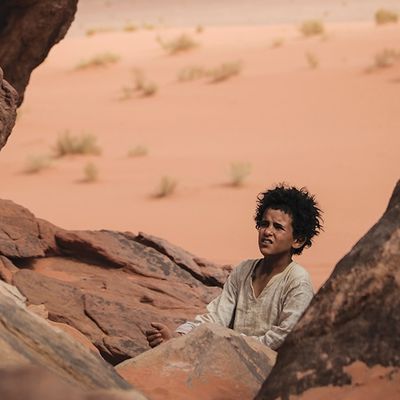
Jordanian director Naji Abu NowarÔÇÖs desert coming-of-age thriller┬áTheeb┬áat times plays like a corrective to Lawrence of Arabia.┬áItÔÇÖs set in 1916, during World War I, when the Arabian Peninsula was still under Ottoman rule and the British were working with local tribes to overthrow them. You wouldnÔÇÖt really know these geopolitics from looking at the film, though: Told from the point of view of a young bedouin boy, this tale unfolds very much in the timeless, spare world of the desert. But these are not the sensuously undulating, lunar dunes of David LeanÔÇÖs masterpiece; rather, the desert in┬áTheeb┬áfeels intimate, rough, real. You can run your hands through the sand and feel the flies on your face. That realism extends to the characters as well, thankfully.
Living in the desert, Theeb (Jacir Eid Al-Hwietat) and his older brother Hussein (Hussein Salameh Al-Sweilhiyeen) are the sons of a recently departed, much-respected sheikh. The two seem inseparable, with the older Hussein showing the boy how to fire a rifle and giving him a knife with which to slaughter a goat. Theeb, however, isnÔÇÖt quite ready yet; the rifle isnÔÇÖt loaded, and he demurs from killing the animal at the last second. One night, an English officer (Jack Fox) shows up and asks for a guide through the desert to a distant well. Hussein departs with him, and Theeb, refusing to leave his brother, follows them.
Through much of the first half of the film, the war peeks through only in small moments: Theeb digs up the occasional bullet casing in the sand, and at one well, the Englishman pulls up some water only to wind up splashing blood on his face. But this is not a tale of childhood reverie interrupted by horror. One of NowarÔÇÖs subtle but surprising accomplishments lies in his matter-of-fact portrait of the filmÔÇÖs young protagonist: Theeb is neither a na├»f through whom we experience a fable, nor a corruptible soul through whom we experience disillusionment. He has to do a lot of growing up in this film, true ÔÇö and we know that he will eventually learn to use a knife and a loaded gun ÔÇö but it all feels organic and real, not mythic or tragic.
I donÔÇÖt want to give away too much, but letÔÇÖs just say that the violence of war eventually makes itself known quite directly to Theeb, who has to endure the realities of loss, survival, and betrayal. But through it all, Nowar never loses sight of the boyÔÇÖs direct experience, and ours. (The filmÔÇÖs opening lines, spoken in voice-over, are: ÔÇ£He who swims in the Red Sea cannot know its true depth.ÔÇØ) Even as the world around Theeb shifts and becomes unfamiliar, and he learns a little of the British and the Ottomans and the ÔÇ£iron donkey trailÔÇØ of the Hejaz Railway, the film remains grounded in the elemental, the practical, and the real.
ThatÔÇÖs not to say it isnÔÇÖt beautiful. Nowar has a great eye for landscape and for the varying patterns and textures of the desert, both big and small ÔÇö from plunging canyons to narrow grooves in the parched earth, from the dust and grit of the day to the pitch-black menace of night. He comes by all that beauty honestly, though. He doesnÔÇÖt need to exoticize this place, or these people, to find drama and suspense. ItÔÇÖs all right there.


